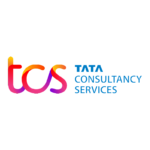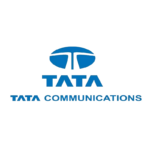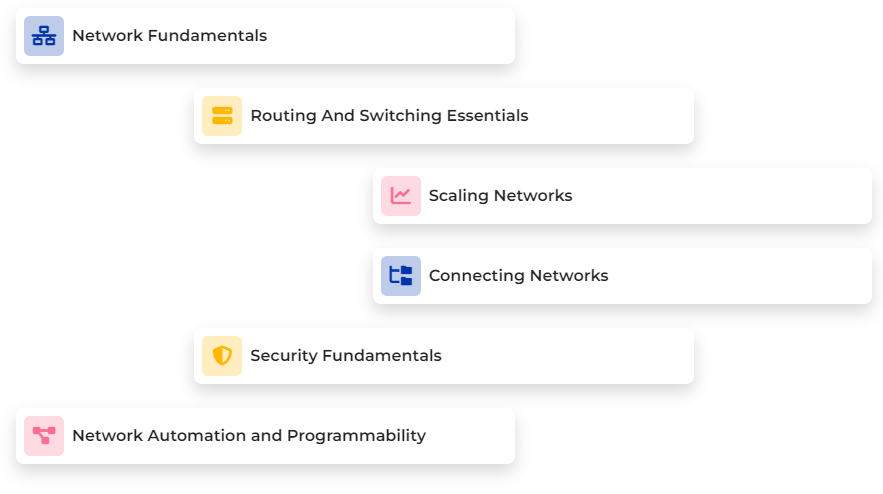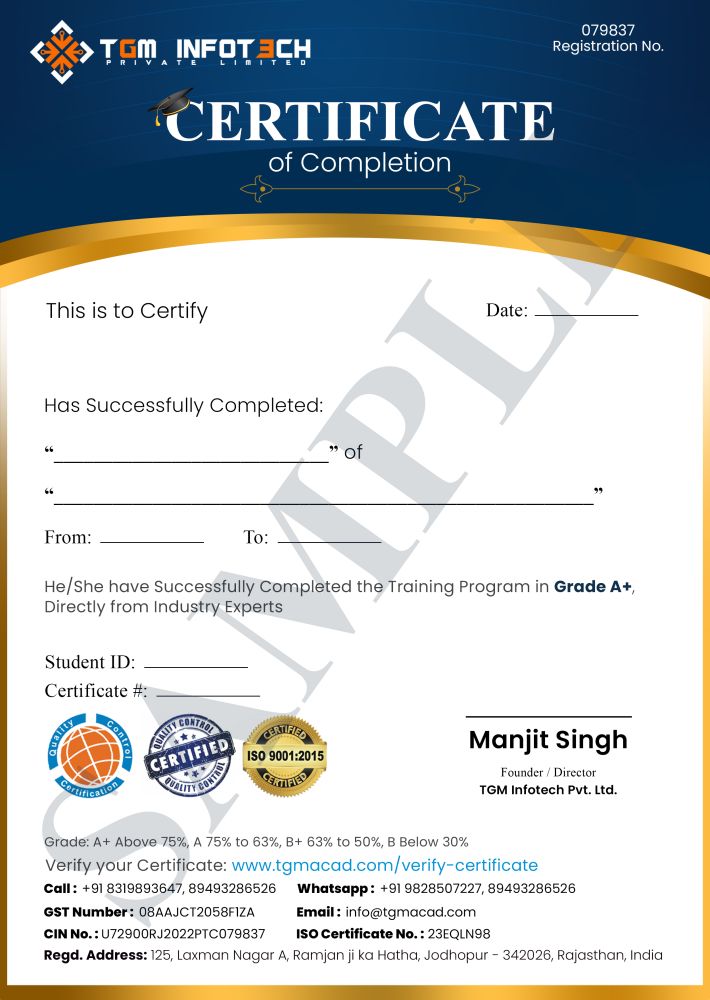Your First Step in Information Technology Industry
Join the Cisco CCNA 200-301 Course
For Just ₹499/-
Become a Network Engineer | Learn from Industry Expert
CCNA 200-301 Complete Course
Learn CCNA Step-By-Step
Course Language
Hindi - हिंदी
Course Language
Hindi - हिंदी
47 hrs Video Lectures
24 Hours Access
Support
Whatsapp or Call
18% GST Applicable
Our Students Work at Companies & Startups










Who is Manjit Singh?
Founder of TGM Infotech Pvt. Ltd.
YouTube
132k+ Subscriber
1k+ Followers
TGM Community
210k+ Active Users
How our Students Rate us





Overview / Requirements
Beginner
15k+ Students Enrolled
Course Language: Hindi - हिंदी
Wi-Fi or Cellular Data
PC / Laptop / Mobile
Course Completion Certificate
18% GST Applicable
Course Description
CCNA 200-301 Self-Study
This CCNA course will help you to improve yourself in networking basics, switching & routing technologies, IPv4 and IPv6. If you are a beginner at networking technologies, our CCNA certification program is great for you! You will get the certification easily with this CCNA course and begin your career in the networking industry. CCNA course, which is prepared by Manjit Singh, covers ALL topics that you need to prepare for the 200-301 (New CCNA) certification exam. You can see the full list of the topics in the curriculum. The six main sections of the training are:


If you don’t understand a topic in the lesson, you can easily rewind the video and watch that part again and again. WHAT ARE THE REQUIREMENTS FOR CCNA COURSE? You don’t need to know anything about networking, Networkel’s training will teach you every topic from zero. For lab sections, you need to install Packet Tracer or GNS3 on your computer. WHAT I WILL GET FROM THIS COURSE? You will learn about networking basics, IPv4, IPv6, switching, and routing and that means you will be ready for the certification exam!
CCNA certification is an excellent step to start a career in the networking industry.
Network Administrator
A network administrator with CCNA certification can expect an average salary of around INR 3 lakhs to INR 4.5 lakhs per year.
NOC Engineer
A NOC Engineer with CCNA certification can expect an average salary of around INR 3 lakhs to INR 6 lakhs per year.
Network Engineer
A network engineer with CCNA certification can expect an average salary of around INR 3.5 lakhs to INR 6 lakhs per year.
IT Manager
An IT Manager with CCNA certification can expect an average salary of around INR 10 lakhs to INR 20 lakhs per year
Course Curriculum
- Explain the role and function of network components
- Describe the characteristics of network topology architectures
- Compare physical interface and cabling types
- Identify interface and cable issues (collisions, errors, mismatch duplex, and/or speed)
- Compare TCP to UDP
- Configure and verify IPv4 addressing and subnetting
- Describe the need for private IPv4 addressing
- Configure and verify IPv6 addressing and prefix
- Compare IPv6 address types
- Verify IP parameters for Client OS (Windows, Mac OS, Linux)
- Describe wireless principles
- Explain virtualization fundamentals (virtual machines)
- Describe switching concepts
- Configure and verify VLANs (normal range) spanning multiple switches
- Configure and verify inter-switch connectivity
- Configure and verify Layer 2 discovery protocols (Cisco Discovery Protocol and LLDP
- Describe the need for and basic operations of Rapid PVST+ Spanning Tree Protocol and identify basic operations
- Configure and verify (Layer 2/Layer 3) EtherChannel (LACP)
- Compare Cisco Wireless Architectures and AP modes
- Describe physical infrastructure connections of WLAN components (AP, WLC, access/trunk ports, and LAG)
- Describe AP and WLC management access connections (Telnet, SSH, HTTP, HTTPS, console, and TACACS+/RADIUS)
- Interpret the components of the routing table
- Determine how a router makes a forwarding decision by default
- Configure and verify IPv4 and IPv6 static routing
- Configure and verify single area OSPFv2
- Describe the purpose of the first-hop redundancy protocol
- Configure and verify inside source NAT using static and pools
- Configure and verify NTP operating in a client and server mode
- Explain the role of DHCP and DNS within the network
- Explain the function of SNMP in network operations
- Describe the use of syslog features including facilities and levels
- Configure and verify DHCP client and relay
- Explain the forwarding per-hop behavior (PHB) for QoS such as classification, etc
- Describe the capabilities and function of TFTP/FTP in the network
- Configure network devices for remote access using SSH
- Define key security concepts (threats, vulnerabilities, exploits, and mitigation techniques)
- Describe security program elements (user awareness, training, and physical access control)
- Configure device access control using local passwords
- Describe security password policies elements, such as management, complexity, and password alternatives
- Describe remote access and site-to-site VPNs
- Configure and verify access control lists
- Configure Layer 2 security features (DHCP snooping, dynamic ARP inspection, and port security)
- Differentiate authentication, authorization, and accounting concepts
- Describe wireless security protocols (WPA, WPA2, and WPA3)
- Configure WLAN using WPA2 PSK using the GUI
- Explain how automation impacts network management
- Describe controller-based and software-defined architectures (overlay, underlay, and fabric)
- Compare traditional networks with controller-based networking
- Describe characteristics of REST-based APIs (CRUD, HTTP verbs, and data encoding)
- Compare traditional campus device management with Cisco DNA Center-enabled device management
- Recognize the capabilities of configuration management mechanisms Puppet, Chef, and Ansible
- Interpret JSON-encoded data
FAQ's
You can get a job after completing the CCNA certification, but you can not expect a high salary package with the beginner-level networking courses.
Passing CCNA can be a bit challenging, but with proper guidance and study material, one can clear the examination with flying colours.
Anyone with a graduation degree is open to enrolling in a CCNA course and learning networking from the beginning
CCNA course does not require coding since it is a beginner-level course that enables an individual to understand the fundamentals of networking in the IT industry.
CCNA certification is good for the future since it marks the beginning of an individuals networking journey in IT and provides them with the basic skills required in the domain.
The best way to study for the CCNA is with a course that prepares you both for the facts of the exam as well as the practical knowledge of configuration. There is a lot about network theory to memorize and keep in mind when you are studying for the CCNA. But equally important is practicing the actual skills that go into managing and configuring Cisco equipment.
18% GST Applicable
This website in no way is affiliated with FaceBook™ or any FaceBook™ entities. Once you leave FaceBook™ the responsibility no longer is on their site.
Please Note: The results shall vary from person to person. During this event, we are creating an environment and providing you with necessary resources and strategies for you to be successful. However, it would completely depend upon your efforts. We have taken all necessary steps to provide you with the most accurate information on this page.
